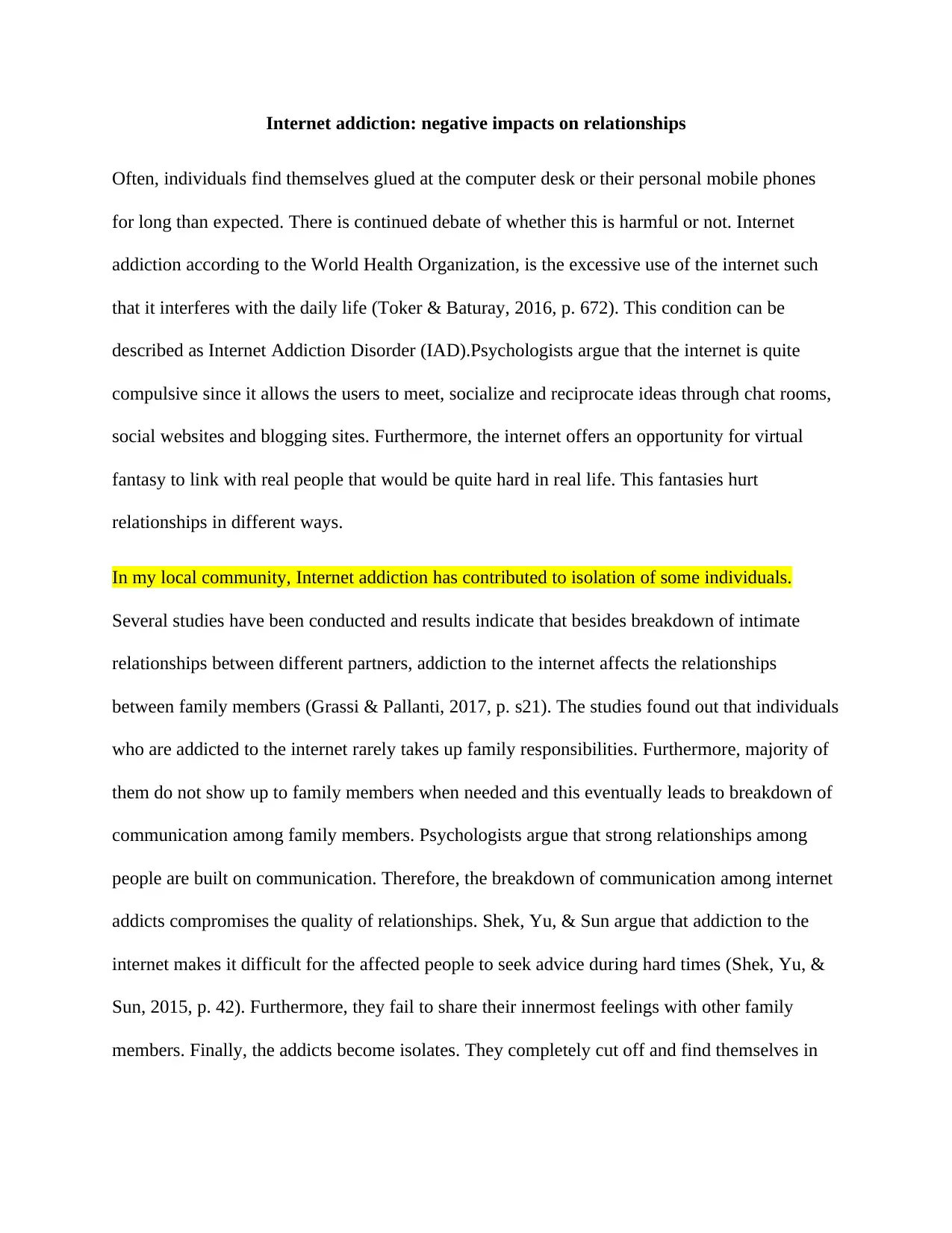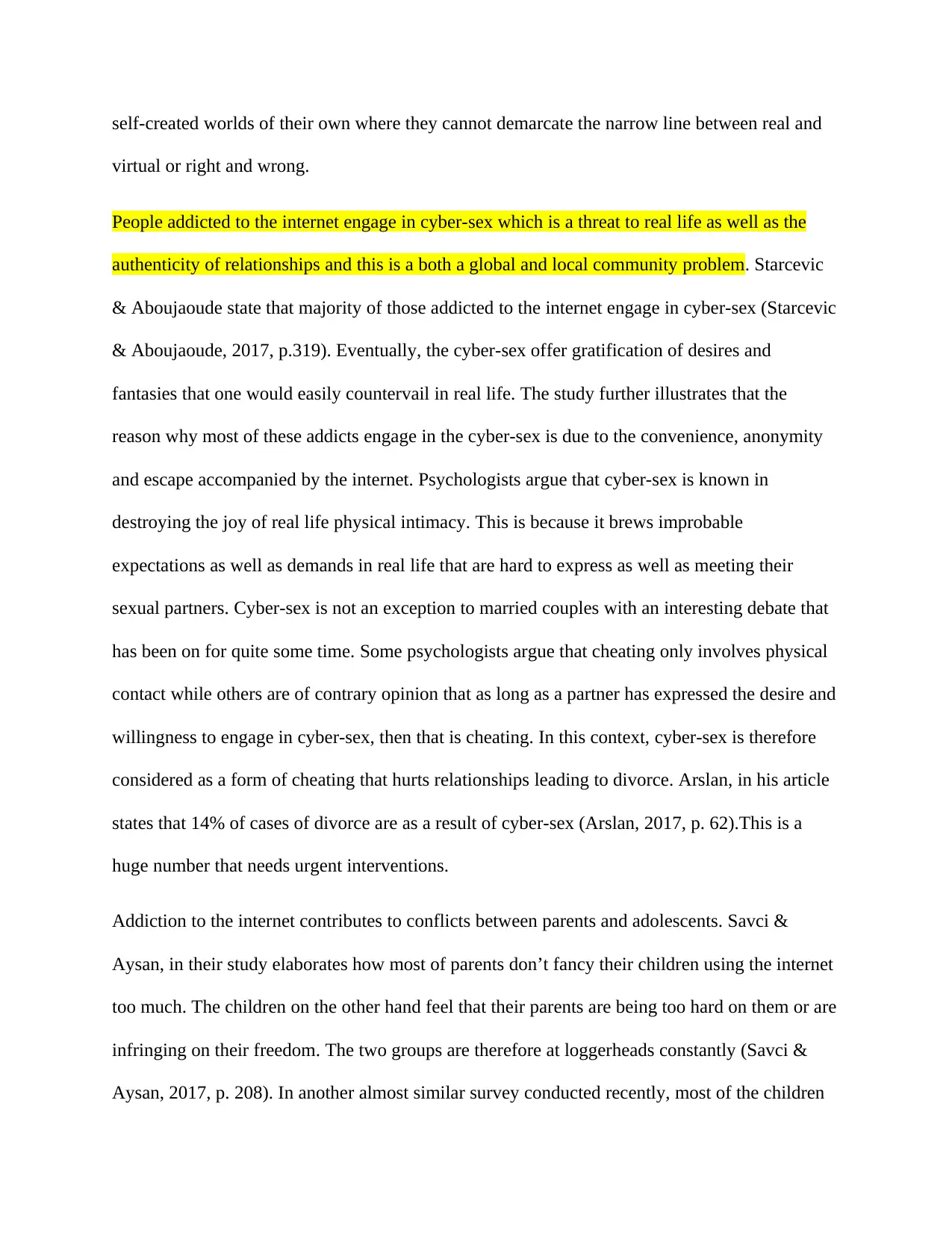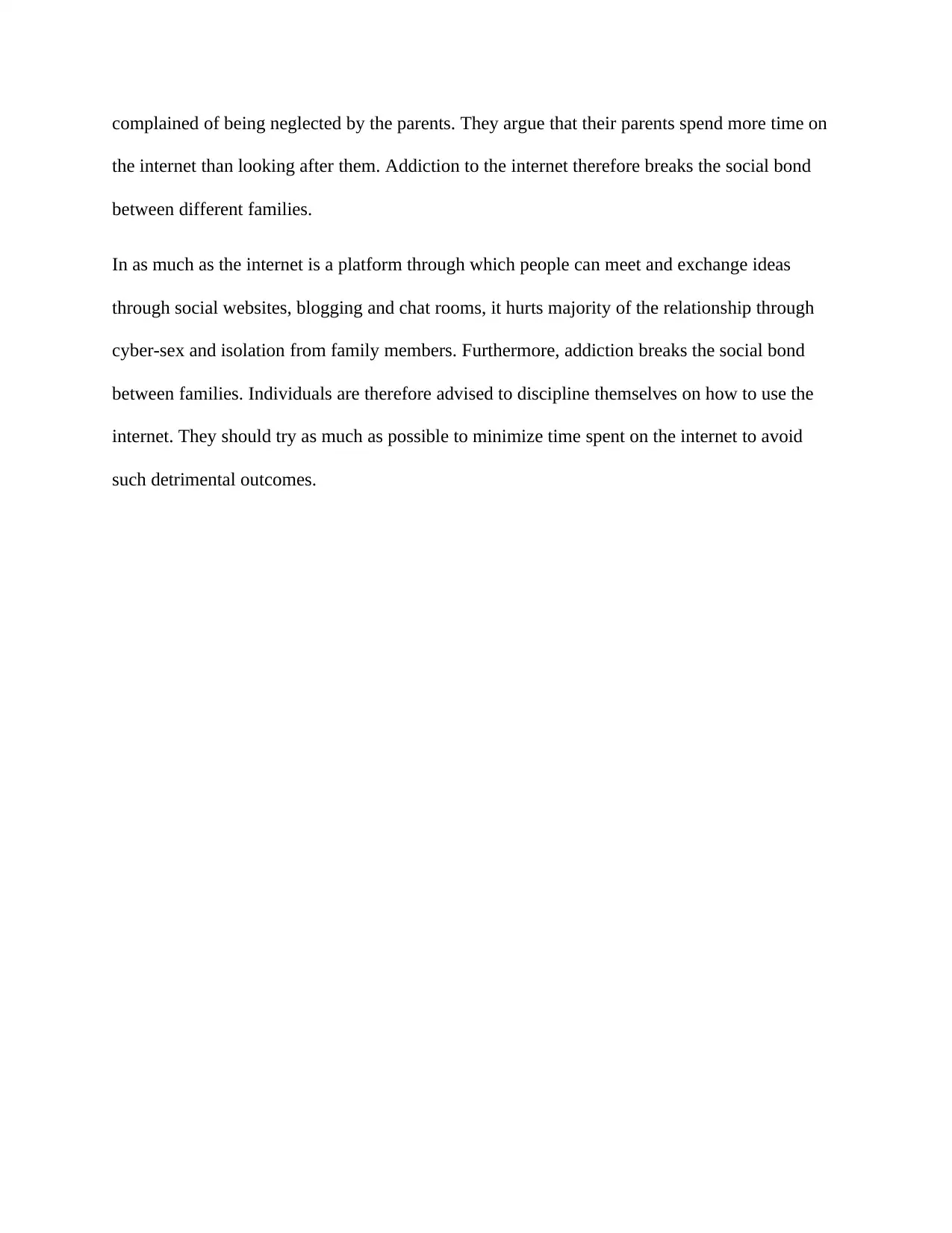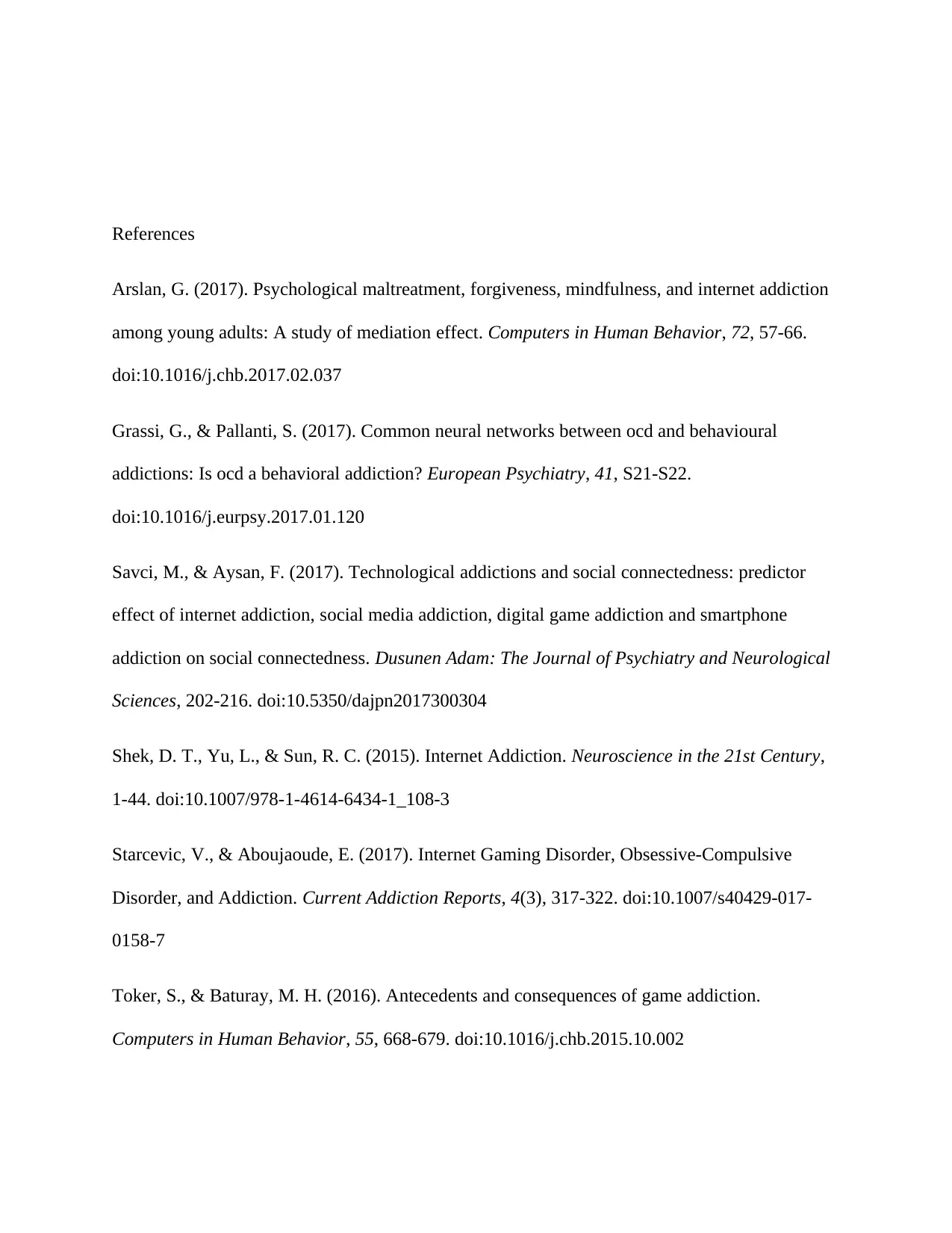Exploring Internet Addiction and Its Negative Impacts on Relationships
VerifiedAdded on 2022/12/23
|6
|1069
|40
Essay
AI Summary
This essay delves into the detrimental effects of internet addiction on various types of relationships, including those within families and between romantic partners. It highlights how excessive internet use can lead to social isolation, breakdowns in communication, and conflicts, particularly between parents and adolescents. The essay discusses the role of cyber-sex in damaging relationships, exploring its impact on real-life intimacy and the potential for infidelity. It references studies and statistics to support its claims, emphasizing the need for individuals to moderate their internet usage to mitigate these negative consequences and preserve the quality of their relationships. The essay concludes by underscoring the importance of self-discipline in managing internet use to avoid the adverse outcomes associated with addiction.

Internet addiction: negative impacts on relationships
Name:
Institution:
Tutor:
Date:
Name:
Institution:
Tutor:
Date:
Paraphrase This Document
Need a fresh take? Get an instant paraphrase of this document with our AI Paraphraser

Internet addiction: negative impacts on relationships
Often, individuals find themselves glued at the computer desk or their personal mobile phones
for long than expected. There is continued debate of whether this is harmful or not. Internet
addiction according to the World Health Organization, is the excessive use of the internet such
that it interferes with the daily life (Toker & Baturay, 2016, p. 672). This condition can be
described as Internet Addiction Disorder (IAD).Psychologists argue that the internet is quite
compulsive since it allows the users to meet, socialize and reciprocate ideas through chat rooms,
social websites and blogging sites. Furthermore, the internet offers an opportunity for virtual
fantasy to link with real people that would be quite hard in real life. This fantasies hurt
relationships in different ways.
In my local community, Internet addiction has contributed to isolation of some individuals.
Several studies have been conducted and results indicate that besides breakdown of intimate
relationships between different partners, addiction to the internet affects the relationships
between family members (Grassi & Pallanti, 2017, p. s21). The studies found out that individuals
who are addicted to the internet rarely takes up family responsibilities. Furthermore, majority of
them do not show up to family members when needed and this eventually leads to breakdown of
communication among family members. Psychologists argue that strong relationships among
people are built on communication. Therefore, the breakdown of communication among internet
addicts compromises the quality of relationships. Shek, Yu, & Sun argue that addiction to the
internet makes it difficult for the affected people to seek advice during hard times (Shek, Yu, &
Sun, 2015, p. 42). Furthermore, they fail to share their innermost feelings with other family
members. Finally, the addicts become isolates. They completely cut off and find themselves in
Often, individuals find themselves glued at the computer desk or their personal mobile phones
for long than expected. There is continued debate of whether this is harmful or not. Internet
addiction according to the World Health Organization, is the excessive use of the internet such
that it interferes with the daily life (Toker & Baturay, 2016, p. 672). This condition can be
described as Internet Addiction Disorder (IAD).Psychologists argue that the internet is quite
compulsive since it allows the users to meet, socialize and reciprocate ideas through chat rooms,
social websites and blogging sites. Furthermore, the internet offers an opportunity for virtual
fantasy to link with real people that would be quite hard in real life. This fantasies hurt
relationships in different ways.
In my local community, Internet addiction has contributed to isolation of some individuals.
Several studies have been conducted and results indicate that besides breakdown of intimate
relationships between different partners, addiction to the internet affects the relationships
between family members (Grassi & Pallanti, 2017, p. s21). The studies found out that individuals
who are addicted to the internet rarely takes up family responsibilities. Furthermore, majority of
them do not show up to family members when needed and this eventually leads to breakdown of
communication among family members. Psychologists argue that strong relationships among
people are built on communication. Therefore, the breakdown of communication among internet
addicts compromises the quality of relationships. Shek, Yu, & Sun argue that addiction to the
internet makes it difficult for the affected people to seek advice during hard times (Shek, Yu, &
Sun, 2015, p. 42). Furthermore, they fail to share their innermost feelings with other family
members. Finally, the addicts become isolates. They completely cut off and find themselves in

self-created worlds of their own where they cannot demarcate the narrow line between real and
virtual or right and wrong.
People addicted to the internet engage in cyber-sex which is a threat to real life as well as the
authenticity of relationships and this is a both a global and local community problem. Starcevic
& Aboujaoude state that majority of those addicted to the internet engage in cyber-sex (Starcevic
& Aboujaoude, 2017, p.319). Eventually, the cyber-sex offer gratification of desires and
fantasies that one would easily countervail in real life. The study further illustrates that the
reason why most of these addicts engage in the cyber-sex is due to the convenience, anonymity
and escape accompanied by the internet. Psychologists argue that cyber-sex is known in
destroying the joy of real life physical intimacy. This is because it brews improbable
expectations as well as demands in real life that are hard to express as well as meeting their
sexual partners. Cyber-sex is not an exception to married couples with an interesting debate that
has been on for quite some time. Some psychologists argue that cheating only involves physical
contact while others are of contrary opinion that as long as a partner has expressed the desire and
willingness to engage in cyber-sex, then that is cheating. In this context, cyber-sex is therefore
considered as a form of cheating that hurts relationships leading to divorce. Arslan, in his article
states that 14% of cases of divorce are as a result of cyber-sex (Arslan, 2017, p. 62).This is a
huge number that needs urgent interventions.
Addiction to the internet contributes to conflicts between parents and adolescents. Savci &
Aysan, in their study elaborates how most of parents don’t fancy their children using the internet
too much. The children on the other hand feel that their parents are being too hard on them or are
infringing on their freedom. The two groups are therefore at loggerheads constantly (Savci &
Aysan, 2017, p. 208). In another almost similar survey conducted recently, most of the children
virtual or right and wrong.
People addicted to the internet engage in cyber-sex which is a threat to real life as well as the
authenticity of relationships and this is a both a global and local community problem. Starcevic
& Aboujaoude state that majority of those addicted to the internet engage in cyber-sex (Starcevic
& Aboujaoude, 2017, p.319). Eventually, the cyber-sex offer gratification of desires and
fantasies that one would easily countervail in real life. The study further illustrates that the
reason why most of these addicts engage in the cyber-sex is due to the convenience, anonymity
and escape accompanied by the internet. Psychologists argue that cyber-sex is known in
destroying the joy of real life physical intimacy. This is because it brews improbable
expectations as well as demands in real life that are hard to express as well as meeting their
sexual partners. Cyber-sex is not an exception to married couples with an interesting debate that
has been on for quite some time. Some psychologists argue that cheating only involves physical
contact while others are of contrary opinion that as long as a partner has expressed the desire and
willingness to engage in cyber-sex, then that is cheating. In this context, cyber-sex is therefore
considered as a form of cheating that hurts relationships leading to divorce. Arslan, in his article
states that 14% of cases of divorce are as a result of cyber-sex (Arslan, 2017, p. 62).This is a
huge number that needs urgent interventions.
Addiction to the internet contributes to conflicts between parents and adolescents. Savci &
Aysan, in their study elaborates how most of parents don’t fancy their children using the internet
too much. The children on the other hand feel that their parents are being too hard on them or are
infringing on their freedom. The two groups are therefore at loggerheads constantly (Savci &
Aysan, 2017, p. 208). In another almost similar survey conducted recently, most of the children
⊘ This is a preview!⊘
Do you want full access?
Subscribe today to unlock all pages.

Trusted by 1+ million students worldwide

complained of being neglected by the parents. They argue that their parents spend more time on
the internet than looking after them. Addiction to the internet therefore breaks the social bond
between different families.
In as much as the internet is a platform through which people can meet and exchange ideas
through social websites, blogging and chat rooms, it hurts majority of the relationship through
cyber-sex and isolation from family members. Furthermore, addiction breaks the social bond
between families. Individuals are therefore advised to discipline themselves on how to use the
internet. They should try as much as possible to minimize time spent on the internet to avoid
such detrimental outcomes.
the internet than looking after them. Addiction to the internet therefore breaks the social bond
between different families.
In as much as the internet is a platform through which people can meet and exchange ideas
through social websites, blogging and chat rooms, it hurts majority of the relationship through
cyber-sex and isolation from family members. Furthermore, addiction breaks the social bond
between families. Individuals are therefore advised to discipline themselves on how to use the
internet. They should try as much as possible to minimize time spent on the internet to avoid
such detrimental outcomes.
Paraphrase This Document
Need a fresh take? Get an instant paraphrase of this document with our AI Paraphraser

References
Arslan, G. (2017). Psychological maltreatment, forgiveness, mindfulness, and internet addiction
among young adults: A study of mediation effect. Computers in Human Behavior, 72, 57-66.
doi:10.1016/j.chb.2017.02.037
Grassi, G., & Pallanti, S. (2017). Common neural networks between ocd and behavioural
addictions: Is ocd a behavioral addiction? European Psychiatry, 41, S21-S22.
doi:10.1016/j.eurpsy.2017.01.120
Savci, M., & Aysan, F. (2017). Technological addictions and social connectedness: predictor
effect of internet addiction, social media addiction, digital game addiction and smartphone
addiction on social connectedness. Dusunen Adam: The Journal of Psychiatry and Neurological
Sciences, 202-216. doi:10.5350/dajpn2017300304
Shek, D. T., Yu, L., & Sun, R. C. (2015). Internet Addiction. Neuroscience in the 21st Century,
1-44. doi:10.1007/978-1-4614-6434-1_108-3
Starcevic, V., & Aboujaoude, E. (2017). Internet Gaming Disorder, Obsessive-Compulsive
Disorder, and Addiction. Current Addiction Reports, 4(3), 317-322. doi:10.1007/s40429-017-
0158-7
Toker, S., & Baturay, M. H. (2016). Antecedents and consequences of game addiction.
Computers in Human Behavior, 55, 668-679. doi:10.1016/j.chb.2015.10.002
Arslan, G. (2017). Psychological maltreatment, forgiveness, mindfulness, and internet addiction
among young adults: A study of mediation effect. Computers in Human Behavior, 72, 57-66.
doi:10.1016/j.chb.2017.02.037
Grassi, G., & Pallanti, S. (2017). Common neural networks between ocd and behavioural
addictions: Is ocd a behavioral addiction? European Psychiatry, 41, S21-S22.
doi:10.1016/j.eurpsy.2017.01.120
Savci, M., & Aysan, F. (2017). Technological addictions and social connectedness: predictor
effect of internet addiction, social media addiction, digital game addiction and smartphone
addiction on social connectedness. Dusunen Adam: The Journal of Psychiatry and Neurological
Sciences, 202-216. doi:10.5350/dajpn2017300304
Shek, D. T., Yu, L., & Sun, R. C. (2015). Internet Addiction. Neuroscience in the 21st Century,
1-44. doi:10.1007/978-1-4614-6434-1_108-3
Starcevic, V., & Aboujaoude, E. (2017). Internet Gaming Disorder, Obsessive-Compulsive
Disorder, and Addiction. Current Addiction Reports, 4(3), 317-322. doi:10.1007/s40429-017-
0158-7
Toker, S., & Baturay, M. H. (2016). Antecedents and consequences of game addiction.
Computers in Human Behavior, 55, 668-679. doi:10.1016/j.chb.2015.10.002

⊘ This is a preview!⊘
Do you want full access?
Subscribe today to unlock all pages.

Trusted by 1+ million students worldwide
1 out of 6
Your All-in-One AI-Powered Toolkit for Academic Success.
+13062052269
info@desklib.com
Available 24*7 on WhatsApp / Email
![[object Object]](/_next/static/media/star-bottom.7253800d.svg)
Unlock your academic potential
Copyright © 2020–2025 A2Z Services. All Rights Reserved. Developed and managed by ZUCOL.
